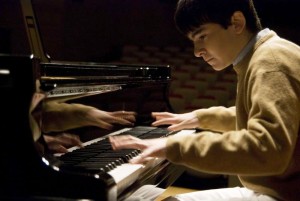Presa despre Ingmar Lazar
 swissclassic.org, 14th of November 2014, Daniel Andres
swissclassic.org, 14th of November 2014, Daniel Andres
A Young Master of the Piano
Aged 21, coming from Paris and having studying with some of the most famous and respected professors, Ingmar Lazar started with a Suite in G by Jean- Philippe Rameau from the 3rd Book of pieces for harpsichord (1726). Finely chiseled music enriched with numerous ornamentations. Work for a clear mind, as well as for fingers. It was a real pleasure to listen to Ingmar Lazar, playing on the modern piano instead of the harpsichord with as much precision and accuracy, as well as being lively and vivid, with a perfect understanding of the late French baroque style, and without succumbing to dryness. A perfectly successful first impression.
After Rameau followed Ravel. Claude Debussy as well as Maurice Ravel often referred themselves to Rameau and their predecessors of the 18th century. To continue the program with Ravel is, in this sense, perfectly logical. We heard “Une barque sur l’océan”, followed by “Alborada del gracioso”, pieces from the “Miroirs”, composed between 1904 and 1906.
These two pieces were orchestrated by Ravel, and there is an unintentional expectation to hear all the richness of the orchestra’s colours on the piano. In the “Barque sur l’océan”, it was the piano sonority that dominated at the beginning. But it would also be logical to perform the original piano version in a pianistic way. We started to listen with our eyes as well during his execution – the big waves, the foam, the noise of the wind, the accoustic and the visual were united and mixing with each other. Many subtle colours came out of the instrument.
The “Alborada del gracioso” started strictly and firmly, exactly as it should be for this imitation of a Spanish guitar. The central part is freer and almost improvised, but the absolute clarity and precision of the interpreter remained, as well as creating the ideal atmosphere that is required here, with the outbursts, the quivering glissandi, the repeated notes, and with orchestral colours as well. The playing of Ingmar Lazar is fascinating in its diversity and richness, technically flawless and in the same time in possession of a great orchestral logic.
And the end of the first French part of the recital we discovered for the first time in Biel, perhaps even in Switzerland, the “Cinq préludes” composed in 1997 by the composer Éric Tanguy (born in 1968). These are again highly demanding pianistical pieces, the first one very virtuosic, the others more lyrical, and the last one almost violent, with thundering fortississimo octaves. These works immediately seduced the public, and Ingmar Lazar performed them in an ideal manner.
The listeners were delighted after the intermission with Chopin’s Ballade no. 4 in F minor op. 52 and the two Nocturnes op. 48. I say ‘delighted’ because the interpretation of the young pianist was a great moment full of emotion. In the ballade, Ingmar Lazar was telling an imaginary story with a perfect understanding of the dramatical development, and was extracting wonderful colours out of the piano, making it sing as well. The nocturne in C minor was an event by itself in this overwhelming performance, and the following piece in F sharp minor was a delicate answer to the drama of the previous one.
The program ended with Alexander Scriabin’s Sonata no. 5 in F sharp major, that confirmed essentially all what we heard until then: an unerring sense of the work’s structure, a fearless approach and without compromises of the artistical message with a transcendent technique, reaching a great liberty of expression. The listeners who came by pure curiosity to discover a young talent left the concert after an encore by Liadov with the feeling of having met a young master of the piano, and that they had had the luck to attend an enriching experience.
Braunschweiger Zeitung, 18th of June 2014, Ulrich Thiele
The Depths of Romanticism
Ingmar Lazar astounded with his pianistic journeys
“I call you to life, O mysterious forces!” Scriabin’s epigraph, cited in his 5th sonata with which Ingmar Lazar culminated his recital, could have been the leitmotiv of his whole programme.
The young French pianist treated the audience to an immaculate, supple performance. In the classical and romantic works that he performed, the necessary expressiveness of the repertoire benefited from added depths thanks to his infallible technique and his uncompromising approach.
He was able to create a remarkable atmosphere in Schubert’s late A Major sonata that comprised the first part of his recital. With great logic, the pianist linked the recurrent display of audacious passages with the charming dance scenes. Even in the extreme culmination of the gently swaying dance rhythm of the Andantino (a real drug trip of the romantic era), Ingmar Lazar’s playing remained clear and rigorous.
His execution of Beethoven’s Sonata no. 5 in the tragic tonality of C minor was also clearly constructed, with a perfect balance between the menacing themes and their lyrical opponents. Wonderful singing tranquillity characterised the Adagio, and Lazar demonstrated his wonderful technical skills in the Presstissimo finale.
His interpretation of the Chopin Nocturne no. 16 in E-flat Major was completely different, showing a side of the romantic composer in one of his most mystical meditations. This ‘night music’ was full of intimate warmth, and Lazar also kept a clear metric organization and formal rigour in the complex rhythmical irregularities.
Scriabin’s Sonata no. 5 in F-sharp Major that followed, variously bearing the appelation of poem, is a real adventurous pianistic work with its unexpected eruptions, and with notations such as “Con Stravaganza” and “Estatico”. The audacity with which Lazar pounced on the keys was remarkable; drunkness and ecstasy, with brief melancholic interruptions. The pianist graciously provided the enthusiastic public with three encores.
Conservatoire Frédéric Chopin, 13th of December 2012, Peter Vizard
Ingmar Lazar presented an exceptional recital with works by Chopin and Szymanowski Wednesday 12th of December 2012 at 8 o’clock p.m. While still a student at the Hochschule in Hanover and despite his young age, Ingmar is already an accomplished pianist who has a musical conception which goes beyond the surface of the works and the habits which are considered as tradition.
L’Alsace, 10th of July, Jacques Weil
Refusing deliberately a demonstrative type of playing, Ingmar Lazar preferred a virtuosity without swagger, which produced a great fusion with the orchestra, sensitivity expressed with the greatest interiority.
Dernières Nouvelles d’Alsace, 10th of July 2012, Pierre Chevreau
Mozart’s piano concerto No. 9, known as Jeunehomme, is a quite large scale piece, reflecting the astonishing maturity of the young composer. We were captivated by the almost cheerful plenitude and the eloquence of the first movement. The fusion, more than the dialogue, between the soloist and the Russian orchestra was the first quality of this performance which went its expressive way without forcing the text. Tragic, the andantino in C minor, was played without insisting on excessive weight which some put into it. The Finale was sprightly performed as it should be, always light in spirit, dark of texture, which went well with this simple classicism, so difficult to sustain. Almost everywhere, the instinctive feeling of the soloist was evident.
Le Berry Républicain, 25th of May 2012
Alexandre Brussilovsky and Ingmar Lazar played with evident pleasure. It was not difficult for these two musicians to captivate their audience with such great talent.
Der Westen, 27th of February 2012, Roland Dymke
In the interpretation of Scriabin’s 5th Sonata given by Ingmar Lazar, who is only 18, the extreme contradictions seemed to answer to each other in a significant manner.
Viaţa noastră, 16th of December 2010, Ruth Guttman Ben Zvi
The Moscow Virtuosi in Tel Aviv
Ingmar Lazar has a number of qualities that are rare, especially for his age: at first a rich tone of great quality, perfect velocity, the so called „pearled touch”, an agility subtlety nuanced and a cantabile phrasing that the opera composer who was Mozart transposed to the keyboard.
Nordkurier, 25th of June 2010, Michael Baumgartl
Festspiele Mecklenburg Vorpommern
Following his sparkling Liszt-Programme last year, he played in Vorpommern on Wednesday evening. This time, for the Chopin Anniversary, he had prepared a purely Chopin- Programme.
Youthful looking, black suit, white shirt, no tie, but with an attitude emphasising calm, he strode onto the stage with a serious face, turned to the audience, smiled politely, sat down at the instrument and immediately became introspective. He began the Fantaisie in F-minor as if improvising, still, searching.
Gradually, he played himself into a fury, opened the dynamics in the Forte that built up to a robust sound and raised his playing to almost hectic virtuosity which was able to base itself on an amazingly brilliant accuracy. After that, two Nocturnes and the Polonaise in F-sharp minor, the latter with emphasised fieriness for dramatic effect. Occasionally, the young pianist allowed both hands to metrically differ slightly from each other, creating, even in the fast passages, the impression of spontaneous inspiration, without the hint of perfect reproduction.
The evening continued with the technical finesse of two Etudes from op. 25. The cascades with the right hand effervesced wildly in A-minor over the simple bass motive that every Chopin lover has been brought up on. And the double octaves in B-minor came over as thundering eruptions which shook the player’s whole body.
But Lazar’s fingers are also suited to the sensitive side of Chopin’s piano style. He sometimes sings along quietly to the melodic treble parts, allows middle-range tones to seep out of them, changing the direction of the harmonic current unexpectedly into surprising new paths, allowing himself time for delicately placed chords.
In the Sonata in B-flat minor, the pianist is developing the greater portion of his expressiveness with the dramatic themes, which demand his enormous virtuosity and can lead him to the edge of ecstasy.
Weser Kurier, 19th of June 2010, Manfred Züghart
A Wonderfully Controlled Performance
A Chopin evening with the 17-year old pianist Ingmar Lazar at the Bremen Sendesall concert hall
Lazar was able to surprise everyone with his maturity of playing and interpretation way beyond his 17 years. And he certainly did not make life easy for himself due to the order of the works, following the “Fantaisie” with the Polonaise Opus 44 and the two Nocturnes Opus 48 and closing the first part with the Scherzo Opus 39. His control was remarkable, and he brought to life this highly virtuoso, challenging piece.
If he had not done so already, after the interval, the French pianist won over the remaining hearts of his audience. The Mazurkas (Opus 59) provided phases of atmospheric serenity before reaching the Sonata Opus 35, with which the guest achieved his “tour de force”. The four heterogenic movements – strictly speaking only actually strung together in a row – were bound together by Lazar with stylistic vehemence into an exciting whole. The stormy opening theme of the “Doppio Movimento” in the first movement still retained clarity and inner serenity. Wonderfully controlled playing – which Lazar showed – is the prerequisite for the second movement (Scherzo), with its widely-spaced chords and precarious octave leaps. The popular Funeral March, the third movement, had serenity and atmosphere, whereas the Presto immediately following rushed past at the limits of its tempo almost in a dreamlike sequence. Enthusiastic applause followed and was rewarded with an encore.
Schaumburger Wochenblatt, 24th of March 2010
Ingmar Lazar brings Frederic Chopin back to life
Brilliant piano concert delights the audience
Frederic Chopin would have thoroughly enjoyed sitting in the Spiegelsaal 200 years later and being witness to a musically exceptional talent performing his works with virtuosity.
Ingmar Lazar understands brilliantly how to bestow Chopin’s musical works with his own interpretation. His concentration, his intuition and his ear for musical nuances were very impressive. His concert was a delight from the opening piece onwards. His Etudes and Mazurkas were as brilliant as his Waltz. The audience had bid their farewell to Ingmar Lazar with a standing ovation.
Schaumburger Zeitung, 9th of March 2010
Brilliantly virtuoso magical sounds of Chopin
Young pianist Ingmar Lazar hailed by the audience
His interpretation of Chopin so impressed the audience that they bade their farewell to him with a standing ovation. He addressed the task of interpreting the artistically creative periods in Chopin’s life in all their colourful facets. In doing so, he withstood the temptation of simply dazzling by pure virtuosity. Instead, he impressed by detailed plasticity of shaping and he succeeded brilliantly in uncovering the varying moods of the pieces.
Ingmar Lazar and Chopin were more that just an impressive combination. He mastered the works in which a broad scale of expression was able to unfold, such as the Fantasie op. 49 or the 3 Mazurkas op. 59 that followed.
It was surprising how quickly one forgot all that one was thinking about Chopin performers and marvelled at the charm that was prevalent during his playing. In the very exciting Scherzo No. 3, op. 39, with which he ended his recital, Ingmar Lazar also revealed absolutely reliable virtuosity and delicate relevance. A Sonata movement, which was played as an encore due to the rapturous applause, was an extra highlight.
Le Quotidien du Médecin, 23rd of November 2009, Olivier Brunel
We will not forget the performance of Ingmar Lazar. He demonstrated a perfect mastery of the instrument and an undeniable artistic temperament.
Aller-Zeitung, 24th of September 2007
Ingmar Anthony Lazar mastered Beethoven’s Waldstein–Sonata brilliantly. The fast-paced runs and polyphonic trills seemed to cause the 14 year old as little difficulty as did Chopin’s Polonaise op. 44, impressive in its temperament and expressiveness.
La Croix, 13th of January 2006, Pierre-Yves le Priol
The Child Prodigy and the Other
It was one of those shocks when one was left wondering: the two hands of the child running on the keyboard, his ten fingers dancing as Lilliputs from left to right. A sovereign mastery showed that we have to deal with a young prodigy who imposes silence to the listener. (13th of January 2006, Pierre-Yves le Priol, La Croix)
La Lettre du Musicien, May 2004, Sylvia Avrand-Margot
Ingmar Anthony Lazar, at ten years old, gave a light, vivid, sparkling, really convincing performance of Liszt’s “Gnomenreigen.




















